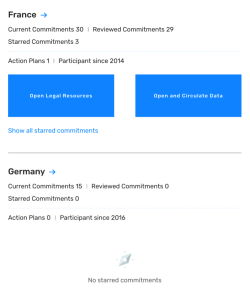Various reports on the digital transformation of the state have recently been published:
- National Action Plan for France
- Action Plan for the National Assembly
- Report addressed to the Prime Minister on data in administrations
These different reports have in common to place the digital transformation of the public good under the sign of the renewal of democracy: more openness, more transparency, more fluidity – a public declension of the ideal of the open organization service of the common good the power and scalability of applications and digital platforms.
France’s public digital transformation strategy is part of a multilateral partnership: the Open Government Partnership, which today brings together 75 countries and hundreds of civil society organizations dedicated to democratic innovation. France seems currently more active within the framework of this partnership than Germany.
This choice seems in line with the strategy adopted by France in terms of artificial intelligence: to position itself less on the object than on the regulation of the object, giving pride of place to innovative uses in all areas of good common.
The first two reports are full of ideas to put the power and scalability of data at the service of democracy, quality of public service, science, or development aid.
However, regulation presupposes a regulatory capacity that remains largely to be built. The “why” requires a “how”. In this respect, the third report proposes a comprehensive vision of “data as infrastructure”. More anchored in concrete achievements, this report explicitly addresses the issue of information sovereignty.
The continuation of this case promises to be exciting, and it will be necessary to keep an eye on the effective arbitrations of the State in the allocation of resources.



